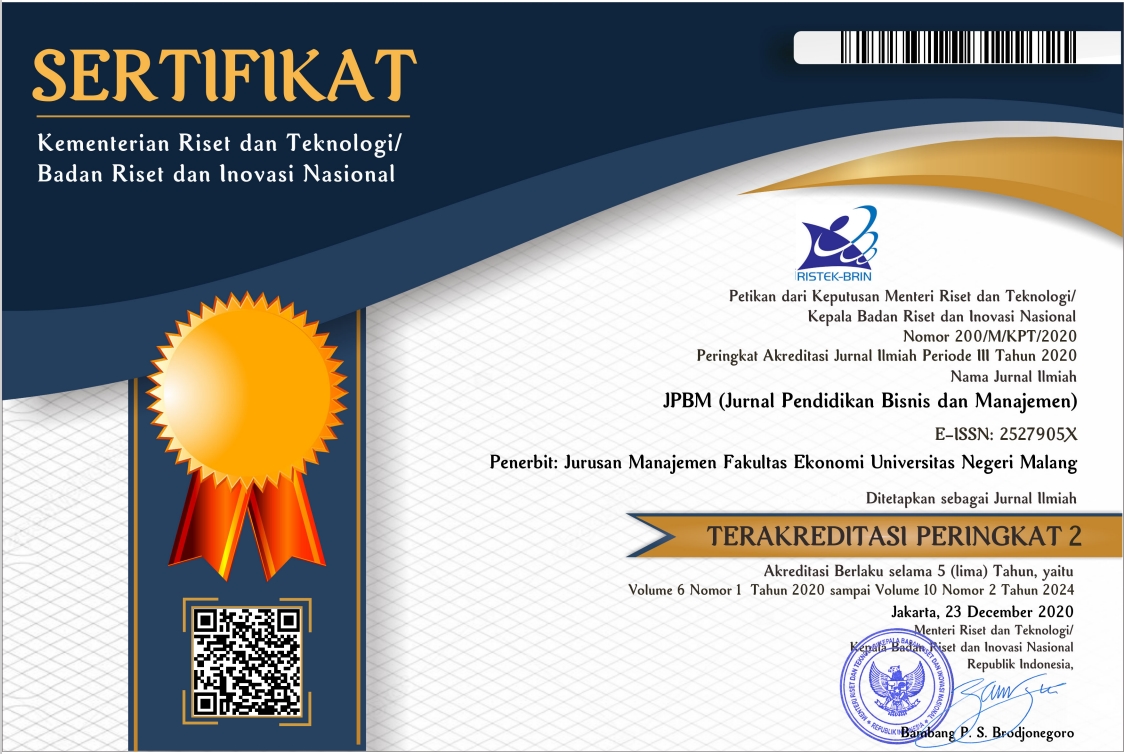Identifying the Dimension of Entrepreneurial Ecosystem for Promoting Entrepreneurial Intention: A Study in Five Educational-Based Universities in Indonesia
Abstract
Entrepreneurship has been recognized among scholars and policy researchers as the driver of economic development. Many studies have identified the strategic role of higher education, especially business education, in increasing students' entrepreneurial intentions. However, the interest in entrepreneurship among students is insufficient. One of the causes of low interest in entrepreneurship among students is the internal or external environment, entrepreneurship learning, practical experience of entrepreneurship, and motivation for entrepreneurship. This study aims to identify the dimension of entrepreneurial ecosystem to promote entrepreneurial intention in several educational-based universities in Indonesia. Using the qualitative method, the findings indicated that each university may have different nuances in terms of developing an entrepreneurial ecosystem and its impact on students’ entrepreneurial intentions. The dimensions of entrepreneurial ecosystems identified in this research include entrepreneurial experience, institutional support, networks and connections, role models, entrepreneurial culture, and the entrepreneurial environment. Thus, it raises implications for the government and educational institutions to infiltrate the programs of other universities to promote entrepreneurial intention.
Keywords: Entrepreneurial intention, Entrepreneurial ecosystem, Business intention, Educational-based university
Full Text:
PDFReferences
Ambad, S. N. A., & Damit, D. H. D. A. (2016). Determinants of entrepreneurial intention among undergraduate students in Malaysia. Procedia Economics and Finance, 37, 108–114.
Baharuddin, G., & Ab Rahman, A. (2021). What is the most effective antecedent for developing entrepreneurial intention among Muslim youth in Indonesia?. Entrepreneurial Business and Economics Review, 9(1), 75–88.
Blesia, J. U., Iek, M., Ratang, W., & Hutajulu, H. (2021). Developing an entrepreneurship model to increase students’ entrepreneurial skills: An action research project in a higher education institution in Indonesia. Systemic Practice and Action Research, 34, 53–70.
Boubker, O., Arroud, M., & Ouajdouni, A. (2021). Entrepreneurship education versus management students’ entrepreneurial intentions. A PLS-SEM approach. The International Journal of Management Education, 19(1), 100450.
Breznitz, S. M., & Zhang, Q. (2019). Fostering the growth of student start-ups from university accelerators: An entrepreneurial ecosystem perspective. Industrial and Corporate Change, 28(4), 855-873.
Do Paço, A., Ferreira, J. M., Raposo, M., Rodrigues, R. G., & Dinis, A. (2015). Entrepreneurial intentions: is education enough?. International Entrepreneurship and Management Journal, 11(1), 57–75.
Elnadi, M., & Gheith, M. H. (2021). Entrepreneurial ecosystem, entrepreneurial self-efficacy, and entrepreneurial intention in higher education: Evidence from Saudi Arabia. The International Journal of Management Education, 19(1), 100458.
Faghih, N., Bonyadi, E., & Sarreshtehdari, L. (2019). Global entrepreneurship capacity and entrepreneurial attitude indexing based on the global entrepreneurship monitor (GEM) dataset. In Globalization and Development (pp. 13–55). Springer, Cham.
Farhangmehr, M., Gonçalves, P., & Sarmento, M. (2016). Predicting entrepreneurial motivation among university students: The role of entrepreneurship education. Education+ Training, 58(7/8), 861–881
Isenberg, D. J. (2010). How to start an entrepreneurial revolution. Harvard Business Review, 88(6), 40–50.
Kusumojanto, D. D., & Wulandari, A. (2021). Does Teaching Factory Matter for Vocational School Students?. JPBM (Jurnal Pendidikan Bisnis dan Manajemen), 6(3), 146–155.
Kusumojanto, D. D., Wibowo, A., Kustiandi, J., & Narmaditya, B. S. (2021). Do entrepreneurship education and environment promote students’ entrepreneurial intention? the role of entrepreneurial attitude. Cogent Education, 8(1), 1948660
Maes, J., Leroy, H., & Sels, L. (2014). Gender differences in entrepreneurial intentions: A TPB multi-group analysis at factor and indicator level. European Management Journal, 32(5), 784–794.
Morris, M. H., Kuratko, D. F., Audretsch, D. B., & Santos, S. (2020). Overcoming the liability of poorness: disadvantage, fragility, and the poverty entrepreneur. Small Business Economics, 1–15.
Neumeyer, X., & Corbett, A. C. (2017). Entrepreneurial ecosystems: Weak metaphor or genuine concept?. In The great debates in entrepreneurship (Vol. 27, pp. 35–45). Emerald Publishing Limited.
Neumeyer, X., & Santos, S. C. (2018). Sustainable business models, venture typologies, and entrepreneurial ecosystems: A social network perspective. Journal of Cleaner Production, 172, 4565–4579.
Paray, Z. A., & Kumar, S. (2020). Does entrepreneurship education influence entrepreneurial intention among students in HEI’s? The role of age, gender and degree background. Journal of International Education in Business, 13(1), 55–72.
Purbasari, R., Wijaya, C., & Rahayu, N. (2019). Interaction of actors and factors in entrepreneurial ecosystem: Indonesian creatives industries. International Journal of Entrepreneurship, 23(1), 13–21.
Ribeiro, A. T. V. B., Uechi, J. N., & Plonski, G. A. (2018). Building builders: entrepreneurship education from an ecosystem perspective at MIT. Triple Helix, 5(1), 1–20.
Saberi, M., & Hamdan, A. (2019). The moderating role of governmental support in the relationship between entrepreneurship and economic growth. Journal of Entrepreneurship in Emerging Economies, 11(2), 200–216
Satriadi, S., Almaududi Ausat, A. M., Heryadi, D. Y., Widjaja, W., & Sari, A. R. (2022). Determinants of entrepreneurial intention: A study on Indonesian students. Bisnis & Birokrasi: Jurnal Ilmu Administrasi dan Organisasi, 29(3), 3–17.
Shi, Y., Yuan, T., Bell, R., & Wang, J. (2020). Investigating the relationship between creativity and entrepreneurial intention: the moderating role of creativity in the theory of planned behavior. Frontiers in Psychology, 11, 1209.
Soomro, B. A., & Shah, N. (2022). Entrepreneurship education, entrepreneurial self-efficacy, need for achievement and entrepreneurial intention among commerce students in Pakistan. Education+ Training, 64(1), 107-125.
Tokila, A. and Tervo, H., 2011. Regional differences in returns to education for entrepreneurs versus wage earners. The Annals of Regional Science, 47(3), 689–710.
Valencia-Arias, A., Arango-Botero, D., & Sánchez-Torres, J. A. (2022). Promoting entrepreneurship based on university students' perceptions of entrepreneurial attitude, university environment, entrepreneurial culture and entrepreneurial training. Higher Education, Skills and Work-Based Learning, 12(2), 328–345.
Wardana, L. W., Narmaditya, B. S., Wibowo, A., Saraswati, T. T., & Indriani, R. (2021). Drivers of entrepreneurial intention among economics students in Indonesia. Entrepreneurial Business & Economics Review, 9(1), 23–33.
Windapo, A. (2018). Entrepreneurial factors affecting the sustainable growth and success of a South African construction company. Sustainability, 10(4), 1276.
DOI: http://dx.doi.org/10.17977/um003v9i22023p134
Refbacks
- There are currently no refbacks.
JPBM (Jurnal Pendidikan dan Bisnis Manajemen) is licensed under a Creative Commons Attribution-NonCommercial-ShareAlike 4.0 International License.
JPBM (Jurnal Pendidikan dan Bisnis Manajemen) is abstracted and indexed in :
















